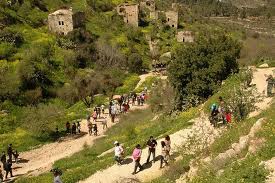
Laura van Rij (LR): What is your connection to Lifta?
Fida Touma (FT): Lifta is part of our collective memory and identity, it is part of our Nakba and our memory of 1948. There is no Palestinian that doesn´t know Lifta. We took photos of the place when we were still able to go to Jerusalem; we know what happened there, how the people got kicked out. What happened in Lifta is common knowledge for Palestinians.
LR: It is not possible for people living in the West Bank to visit?
FT: Some people have an ID-card from Jerusalem, they can go. Some get permits to visit Lifta, but only to go there once or twice a year. I drive by once a week but I usually don´t go there, just sometimes.
LR: How was it for you to be there?
FT: Because I´m working for Riwaq I´m very familiar with Palestinian villages, how they look like, the context, the architecture…Lifta is very special in terms of the wealth of architectural details; it shows how aesthetically rich the people of Lifta were. Seeing these buildings is also very emotional for me, because I know that it used to be Palestinian land. I can imagine families living there and now… I don´t like going there, it´s so beautiful, to see it all deserted is not easy.
LR: How do people in Ramallah keep Lifta in their memory?
FT: There are many Liftawi´s in Ramallah, they are a close community. Lifta was wealthy; it was a community of educated people. Many people still carry the name Liftawi, which means that they or their family come from Lifta. They have their weddings together, they all know each other. They are still connected. There is a link between the way we imagine Lifta to have been and how we see the Liftawi´s today. How life must have been back then.
LR: How did you get involved in the coalition to save Lifta?
FT: Yacoub Odeh told us about the coalition, about their work and the building plans. We do not work with the Israeli government or municipality and we cannot be part of the coalition. Our main competence is our knowledge of architectural heritage and our ability to document and classify. We want Lifta to be saved but we are not part of the official legal process.
LR: What do you think will happen to Lifta?
FT: I do not know, but I am realistic too. I hope the coalition will be successful in saving it but think they are in for a fierce fight. I do not think the municipality of Jerusalem will stop its plans to `develop´ the area, I do not know, into a kind of fancy archaeological park, a mall, residencies…
LR: What would you like to happen?
FT: To be saved for sure but how I don´t know… I don´t want them to start building there, it hurts me. Maybe it should be saved as a monument to the people who lived there, as a witness to what existed. But we already lost a huge part of Lifta, and every winter more buildings get destroyed.The buildings should be preserved but not like an open air museum. If Israel would put signs with the history of the place they would not tell the truth probably. As I see it… Just save it, just save the buildings for the aesthetic and architectural value.
LR: But if you really could choose anything?
FT: I want the families to come back and use their houses; it is their property and their right. Using the houses saves them; they have to be part of people’s lives again. I wish that to Lifta but that is not going to happen. You have to be pragmatic about it and just save the buildings, forget about Palestine and Israel, forget about history… I don´t know what to say.

